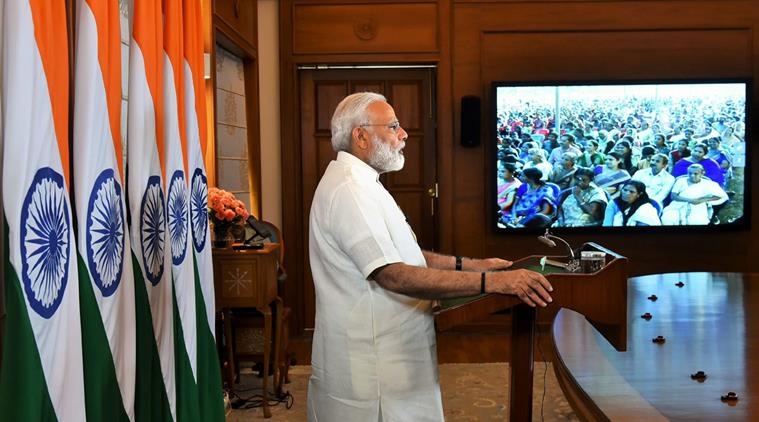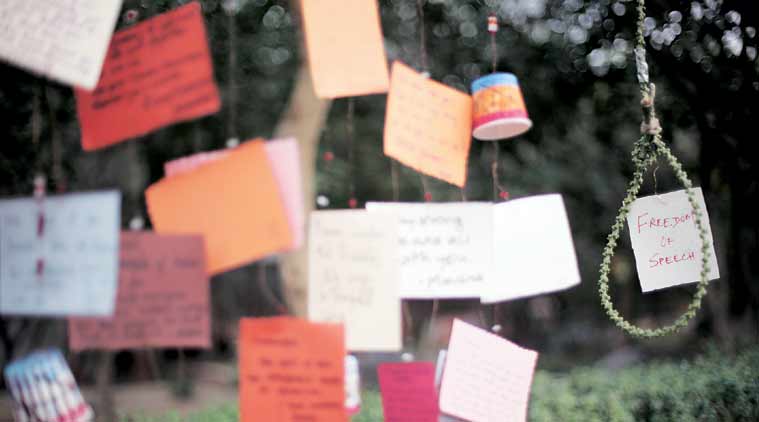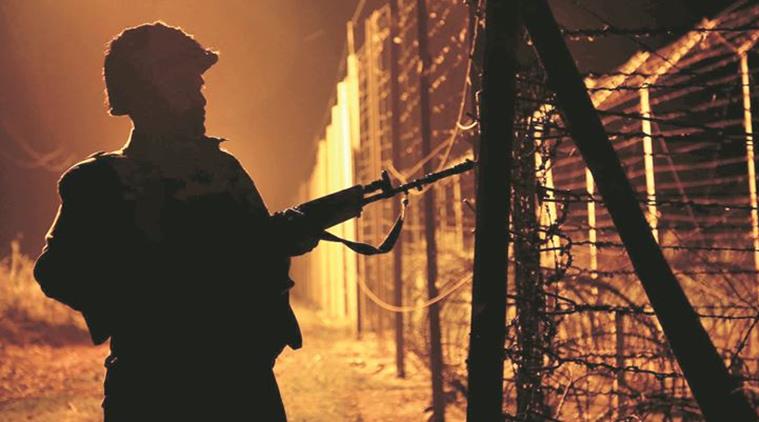Politics must be muscular, majoritarian with a no-holds-barred campaign to invade the minds of citizens, embedding in them the mirage of change for the better.
 New Delhi: Prime Minister Narendra Modi addressing at the inauguration of the Synthetic Track of the USHA School, via video conference, in New Delhi on Thursday. PTI Photo / PIB (PTI6_15_2017_000222B)I worry for my country.
New Delhi: Prime Minister Narendra Modi addressing at the inauguration of the Synthetic Track of the USHA School, via video conference, in New Delhi on Thursday. PTI Photo / PIB (PTI6_15_2017_000222B)I worry for my country.
The Narendra Modi-Amit Shah duo are establishing new norms for both the government and politics. For Modi, the machinery of government is meant for self-propagation. Government is a vehicle to announce, through means fair and foul, new water-marks of performance, whether or not they have any reference to reality. Ends justify the means. For Shah, the new idiom of politics is to belittle all that happened prior to 2014 and to build a larger-than-life image of the BJP. For both, facts are irrelevant, only perception matters. Politics must be muscular, majoritarian with a no-holds-barred campaign to invade the minds of citizens, embedding in them the mirage of change for the better.
The duo, with these ends in mind, attempt to cajole, threaten, and, if necessary, capture the narrative that serves their political objectives. They regard the CBI and other investigating agencies, including the ED, the NIA and the state investigating agencies where the BJP is in government, the departments of the Government of India or state governments, who do their bidding. The media, particularly the electronic media, is no longer a platform for disseminating news to allow viewers the freedom to decide for themselves, but a propaganda vehicle for the government as well as the BJP. Business houses, potential recipients of beneficial government policies, sing paeans for favours. Vulnerable to proceedings by taxmen, they are susceptible to surrendering national interest by doing the government’s bidding.
The Republic has been taken for a ride. The nature of the Indian state has changed since 2014.
On the ground, we see the rise of an intolerant, aggressive majoritarian mindset. Hindutva, which has nothing to do with Hinduism, is represented by vigilantes, ready to kill human beings to save a cow. Anti-Romeo squads, love jihad and the conversation on triple talaq embolden the embers of intolerance. Consequent fires are stoked by some electronic channels and the army of soldiers on social media platforms seconded, perhaps by the BJP, who run amok with threats and abuses to silence opposition. There is no scope for discussion or debate. There is no nuanced position on any issue.
Demonetisation was successful because the prime minister was decisive in his intent to target black money, even though millions lost their jobs and more than 100 people died in queues. Its impact is still felt by sectors of the economy which are struggling to recover. Surgical strikes epitomised nationalistic fervour and the commitment to punish those who seek to intrude across the border. This one-off was projected as a panacea, ensuring that Pakistan dare not foray across the border again.
We are told that the entire opposition is corrupt and the government is scandal-free. Three years of a BJP government, the duo says, have transformed India. There is hope for the common citizen. Shah says that what the BJP has done in three years, the Congress did not do in 70. The BJP, we are told, got rid of nepotism and caste-based politics, yet Yogi Adityanath provides soap and sachets of shampoo to Dalits before he visits them. Dalits at Una are flogged but that has nothing to do with caste.
The inauguration of the Dhola-Sadiya 9.15 km bridge, connecting Assam and Arunachal Pradesh, construction of which began in 2010, and the longest road tunnel (9.2 km) inaugurated on April 2, 2017, cutting the distance between Jammu and Srinagar by 30 km, for which construction started in May 2011, are photo-ops for Modi. They claim that GDP continues to grow above 7 per cent and the Sensex being at a record high are achievements of this government. The people, according to the duo, must celebrate every day for the transformation of India as it moves to be a $20 trillion economy in the near future.
It is as if the history of India started in 2014 and all the years before that, since Independence, were a washout. That there are no jobs for the 12 million kids who move out of school will never make headline news; nor will these be topics to rant about in a channel which is perceived as the alter ego of the government. That only 1.35 lakh jobs were created in 2015 and over 2 lakh jobs in 2016 is a matter of little concern because Shah now says that it is not for the government to create jobs. That a world moving towards automation will leave millions jobless in India is of no relevance since the duo’s politics is to win the next election. Thoughtless rollbacks in the education system will disempower our children. We need to prepare our children to compete in a global environment. That is not a matter of much concern, both for the media and government. That institutions of government are being saffronised with RSS pracharaks being selectively picked in utter disregard of the quality and culture of our constitution is disheartening.
Healthcare is for the rich; public health facilities for the poor are shoddy. The real estate market has collapsed; interest rates are down and the economy is stagnant. The offtake of bank credit is negligible and inventories in factories have dampened the prospects of enhanced productivity. The small and medium-scale sector, the backbone of our economy, is dormant and needs hand-holding. Black money is back in circulation along with fake notes. Demonetisation has not deterred terrorists. GDP numbers, no longer relied on, are for academics to debate. Yet the government keeps on patting itself on the back.
Both government and politics in India are far removed from the concerns of the common person. The brazen attitude of establishments to take their partisan agenda forward is disquieting. The state’s constitutional commitment for bringing peace and tranquillity is not a priority. This exclusive duo wants an exclusive India. That is their hope. We must get together to challenge the duo and ensure that in 2019, we start afresh.


 Photo for representational purpose.
Photo for representational purpose.